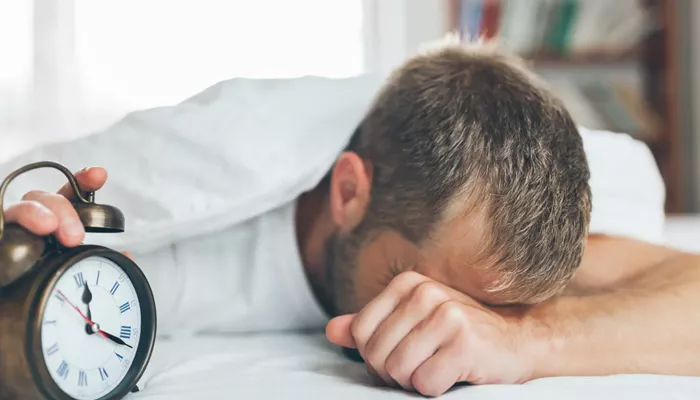Sleep is essential for overall health and well-being. Its effects on the body are profound, influencing everything from cognitive function to physical health. One area where sleep plays a crucial role is in hair health. This article explores the connection between inadequate sleep and hair loss, examining the mechanisms involved and the potential consequences of sleep deprivation on hair follicles.
Understanding Hair Growth
To understand how sleep affects hair loss, it’s essential to first grasp how hair growth works. Hair growth occurs in a cycle with three main phases:
Anagen Phase (Growth Phase): This is the active phase where hair grows. It can last for several years, depending on genetics and other factors.
Catagen Phase (Transitional Phase): This short phase lasts a few weeks, during which the hair stops growing and the follicle begins to shrink.
Telogen Phase (Resting Phase): This phase lasts for several months. The hair is no longer growing but is not yet shed. At the end of this phase, the hair falls out, and a new hair begins to grow in its place.
The Role of Sleep in Hair Health
Sleep plays a significant role in maintaining overall health and can influence hair growth in several ways:
Regulation of Hormones: Sleep helps regulate hormones that are crucial for hair growth. The body produces various hormones during sleep, including growth hormone, which aids in cellular repair and regeneration.
Reduction of Stress: Adequate sleep helps manage stress levels. Chronic stress, often associated with poor sleep, can lead to hair loss conditions such as telogen effluvium, where a large number of hairs prematurely enter the telogen phase.
Cellular Repair: During sleep, the body engages in repair processes that affect hair follicles. The repair and rejuvenation of cells are crucial for maintaining healthy hair growth.
Effects of Sleep Deprivation on Hair Loss
Inadequate sleep can disrupt these processes and negatively impact hair health. Here are some ways sleep deprivation may contribute to hair loss:
Increased Stress Hormones:
Lack of sleep can elevate stress hormones like cortisol. Elevated cortisol levels are linked to hair loss, as high cortisol levels can push hair follicles into the telogen phase prematurely.
Disruption of Hair Growth Cycle:
Sleep deprivation can interfere with the normal hair growth cycle. When the body does not get enough rest, the anagen phase can shorten, reducing the time hair spends growing and increasing the likelihood of hair shedding.
Decreased Blood Flow:
During sleep, blood flow to the scalp increases, delivering essential nutrients and oxygen to hair follicles. Poor sleep can reduce this blood flow, affecting the health and growth of hair.
Impaired Immune Function:
Sleep is vital for a well-functioning immune system. Inadequate sleep can impair immune function, potentially leading to autoimmune conditions like alopecia areata, where the immune system attacks hair follicles.
Scientific Evidence on Sleep and Hair Loss
Several studies have investigated the link between sleep and hair loss. Here’s a summary of key findings:
Impact of Sleep Disorders:
Research has shown that sleep disorders such as insomnia and sleep apnea are associated with hair loss. One study found that individuals with chronic insomnia were more likely to experience increased hair shedding.
Effects of Sleep Quality:
A study published in the Journal of Clinical Sleep Medicine revealed that poor sleep quality was correlated with an increase in hair loss. Participants who reported low-quality sleep experienced more significant hair thinning compared to those with better sleep.
Stress and Hair Loss:
Numerous studies highlight the connection between stress and hair loss. Since poor sleep contributes to stress, it indirectly affects hair health. For example, research in the Journal of Dermatology showed that individuals with high stress levels due to sleep deprivation experienced increased hair shedding.
SEE ALSO: Is There Any Medicine to Stop Hair Fall?
Practical Tips for Improving Sleep and Hair Health
To mitigate the impact of poor sleep on hair health, consider the following tips:
Establish a Consistent Sleep Schedule:
Going to bed and waking up at the same time every day helps regulate your internal clock and improve sleep quality.
Create a Relaxing Bedtime Routine:
Engage in calming activities before bed, such as reading or taking a warm bath, to help signal to your body that it’s time to wind down.
Optimize Your Sleep Environment:
Ensure your bedroom is conducive to sleep by keeping it dark, quiet, and cool. Invest in a comfortable mattress and pillows.
Limit Exposure to Screens:
Avoid screens for at least an hour before bedtime, as the blue light emitted by phones and computers can interfere with melatonin production and sleep quality.
Manage Stress:
Practice stress-reducing techniques such as meditation, deep breathing exercises, or yoga to help manage stress levels and improve sleep.
Diet and Lifestyle Considerations
In addition to improving sleep, certain lifestyle and dietary changes can support hair health:
Balanced Diet:
Eat a diet rich in vitamins and minerals essential for hair growth, such as iron, zinc, biotin, and vitamins A and C.
Hydration:
Stay well-hydrated to maintain optimal scalp health.
Regular Exercise:
Engage in regular physical activity to improve overall health and manage stress, which can positively impact hair health.
Conclusion
In summary, sleep is integral to maintaining healthy hair growth. Inadequate sleep can disrupt the hair growth cycle, increase stress levels, and impair cellular repair processes, all of which can contribute to hair loss. Ensuring you get sufficient, high-quality sleep is essential for overall health and can help mitigate the risk of hair loss. By adopting good sleep habits and making lifestyle changes, you can support both your overall well-being and the health of your hair.

